Theories of Development and Learning: Early Childhood Stage Analysis
VerifiedAdded on 2020/12/18
|8
|2256
|167
Report
AI Summary
This report provides a comprehensive overview of theories of development and learning, focusing on the early childhood stage (ages 3-8). It explores the physical, cognitive, social, and emotional development milestones, providing insights into how children grow and learn. The report emphasizes the role of teachers and parents in shaping children's behavior, with specific implications for emotional, physical, social, and cognitive development. It also discusses effective teaching strategies, such as guided play and sound recognition, to enhance children's cognitive and social skills. The report concludes by highlighting the importance of considering children's characteristics and parental attributes when implementing teaching strategies, supported by references to relevant literature and online resources. This report is a great resource for students seeking to understand child development and effective educational practices.
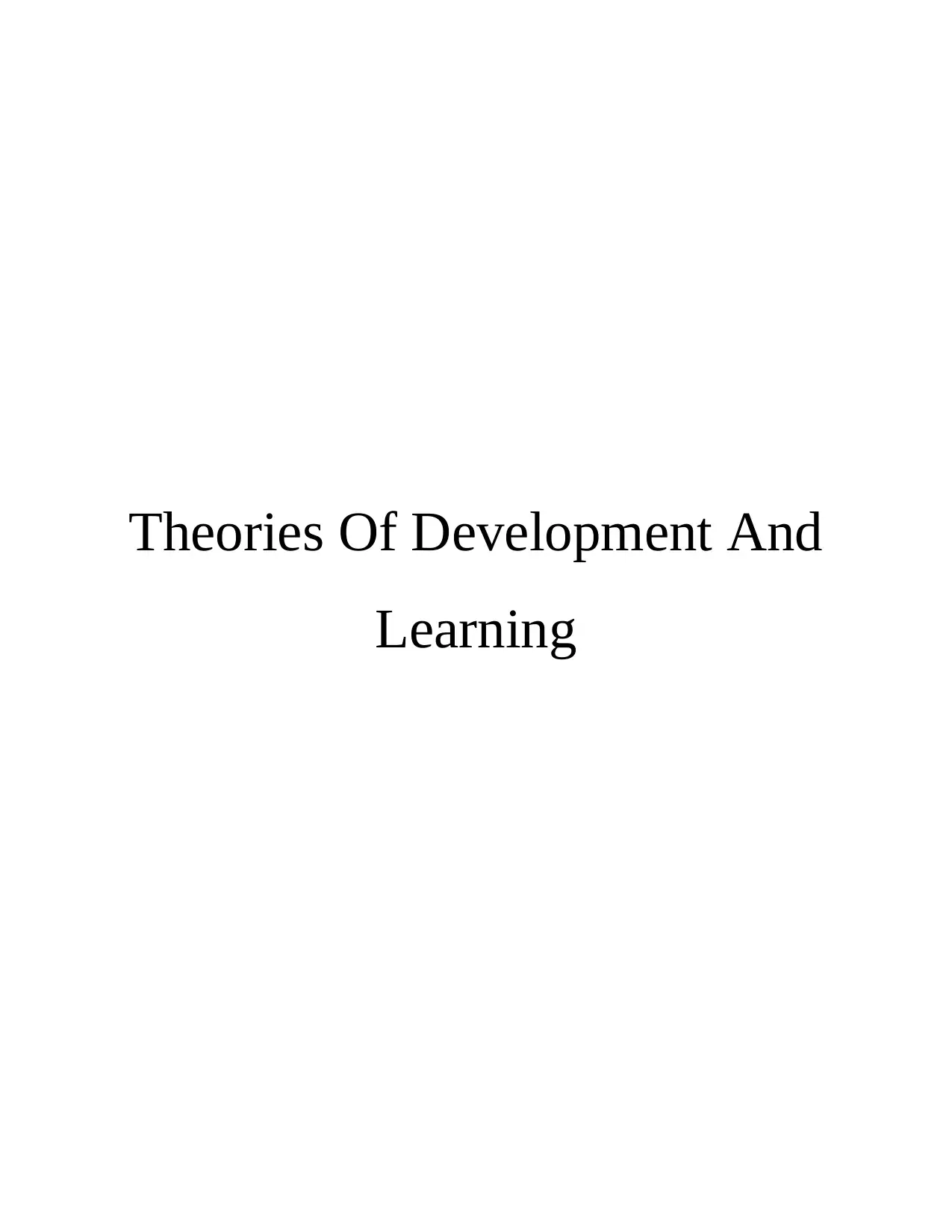
Theories Of Development And
Learning
Learning
Paraphrase This Document
Need a fresh take? Get an instant paraphrase of this document with our AI Paraphraser
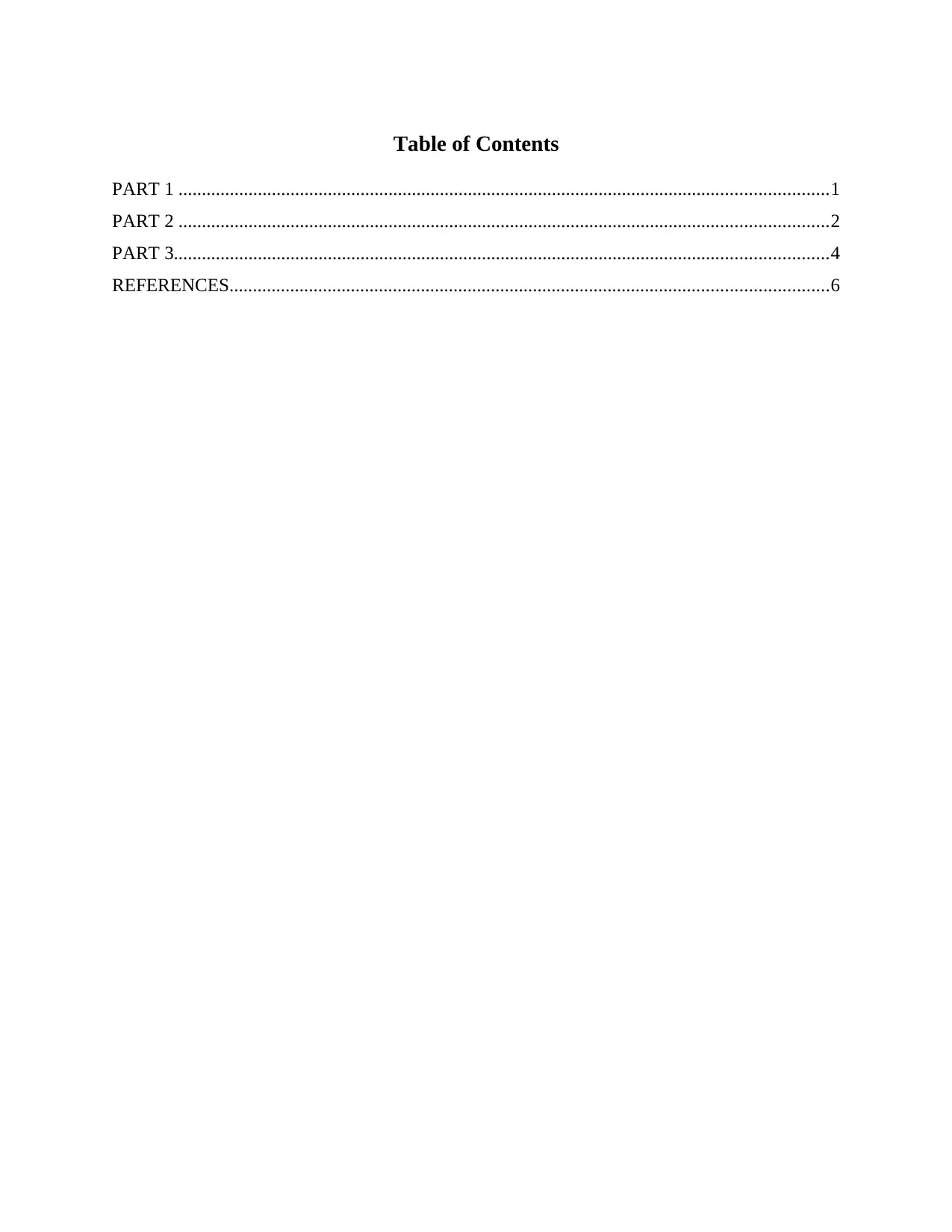
Table of Contents
PART 1 ...........................................................................................................................................1
PART 2 ...........................................................................................................................................2
PART 3............................................................................................................................................4
REFERENCES................................................................................................................................6
PART 1 ...........................................................................................................................................1
PART 2 ...........................................................................................................................................2
PART 3............................................................................................................................................4
REFERENCES................................................................................................................................6
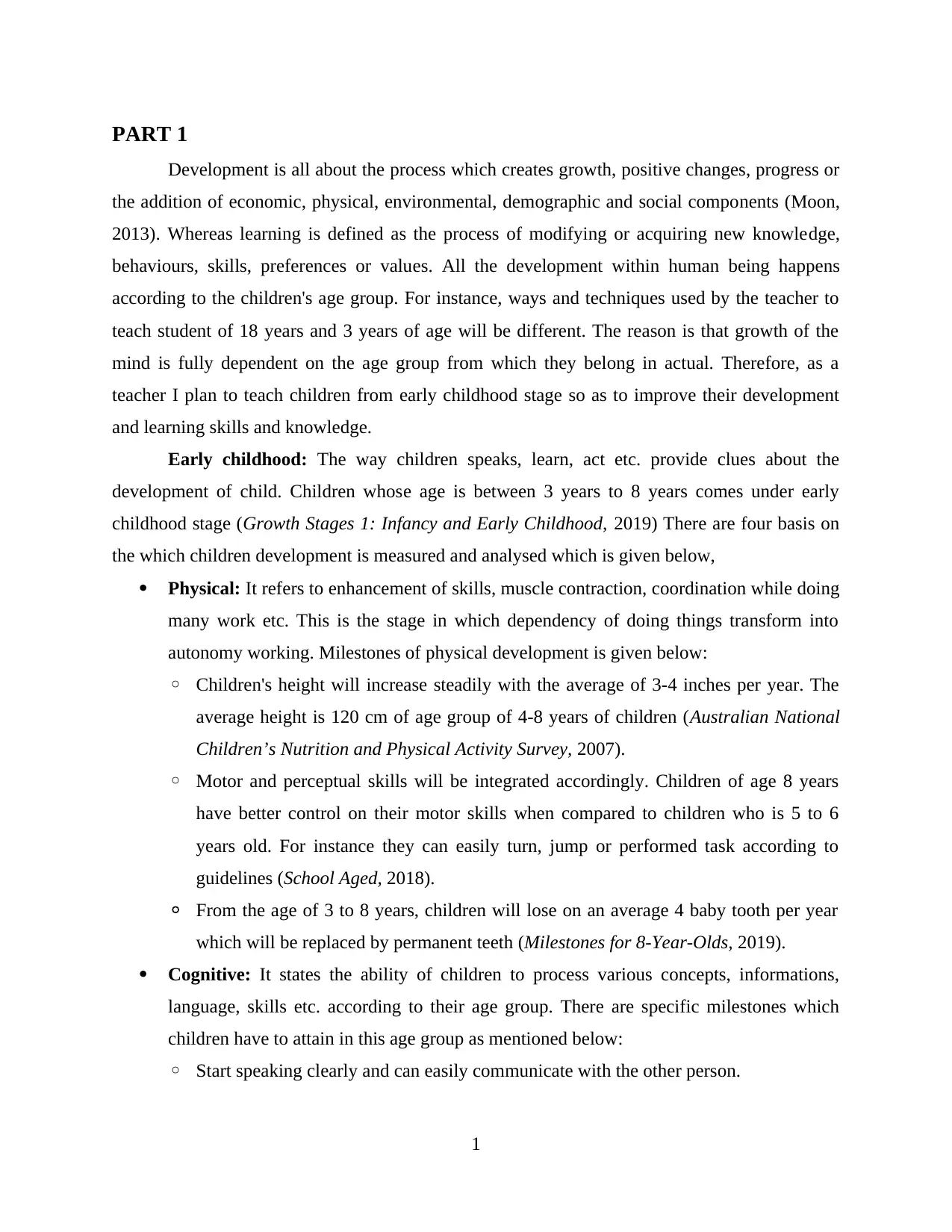
PART 1
Development is all about the process which creates growth, positive changes, progress or
the addition of economic, physical, environmental, demographic and social components (Moon,
2013). Whereas learning is defined as the process of modifying or acquiring new knowledge,
behaviours, skills, preferences or values. All the development within human being happens
according to the children's age group. For instance, ways and techniques used by the teacher to
teach student of 18 years and 3 years of age will be different. The reason is that growth of the
mind is fully dependent on the age group from which they belong in actual. Therefore, as a
teacher I plan to teach children from early childhood stage so as to improve their development
and learning skills and knowledge.
Early childhood: The way children speaks, learn, act etc. provide clues about the
development of child. Children whose age is between 3 years to 8 years comes under early
childhood stage (Growth Stages 1: Infancy and Early Childhood, 2019) There are four basis on
the which children development is measured and analysed which is given below,
Physical: It refers to enhancement of skills, muscle contraction, coordination while doing
many work etc. This is the stage in which dependency of doing things transform into
autonomy working. Milestones of physical development is given below:
◦ Children's height will increase steadily with the average of 3-4 inches per year. The
average height is 120 cm of age group of 4-8 years of children (Australian National
Children’s Nutrition and Physical Activity Survey, 2007).
◦ Motor and perceptual skills will be integrated accordingly. Children of age 8 years
have better control on their motor skills when compared to children who is 5 to 6
years old. For instance they can easily turn, jump or performed task according to
guidelines (School Aged, 2018).
◦ From the age of 3 to 8 years, children will lose on an average 4 baby tooth per year
which will be replaced by permanent teeth (Milestones for 8-Year-Olds, 2019).
Cognitive: It states the ability of children to process various concepts, informations,
language, skills etc. according to their age group. There are specific milestones which
children have to attain in this age group as mentioned below:
◦ Start speaking clearly and can easily communicate with the other person.
1
Development is all about the process which creates growth, positive changes, progress or
the addition of economic, physical, environmental, demographic and social components (Moon,
2013). Whereas learning is defined as the process of modifying or acquiring new knowledge,
behaviours, skills, preferences or values. All the development within human being happens
according to the children's age group. For instance, ways and techniques used by the teacher to
teach student of 18 years and 3 years of age will be different. The reason is that growth of the
mind is fully dependent on the age group from which they belong in actual. Therefore, as a
teacher I plan to teach children from early childhood stage so as to improve their development
and learning skills and knowledge.
Early childhood: The way children speaks, learn, act etc. provide clues about the
development of child. Children whose age is between 3 years to 8 years comes under early
childhood stage (Growth Stages 1: Infancy and Early Childhood, 2019) There are four basis on
the which children development is measured and analysed which is given below,
Physical: It refers to enhancement of skills, muscle contraction, coordination while doing
many work etc. This is the stage in which dependency of doing things transform into
autonomy working. Milestones of physical development is given below:
◦ Children's height will increase steadily with the average of 3-4 inches per year. The
average height is 120 cm of age group of 4-8 years of children (Australian National
Children’s Nutrition and Physical Activity Survey, 2007).
◦ Motor and perceptual skills will be integrated accordingly. Children of age 8 years
have better control on their motor skills when compared to children who is 5 to 6
years old. For instance they can easily turn, jump or performed task according to
guidelines (School Aged, 2018).
◦ From the age of 3 to 8 years, children will lose on an average 4 baby tooth per year
which will be replaced by permanent teeth (Milestones for 8-Year-Olds, 2019).
Cognitive: It states the ability of children to process various concepts, informations,
language, skills etc. according to their age group. There are specific milestones which
children have to attain in this age group as mentioned below:
◦ Start speaking clearly and can easily communicate with the other person.
1
⊘ This is a preview!⊘
Do you want full access?
Subscribe today to unlock all pages.

Trusted by 1+ million students worldwide
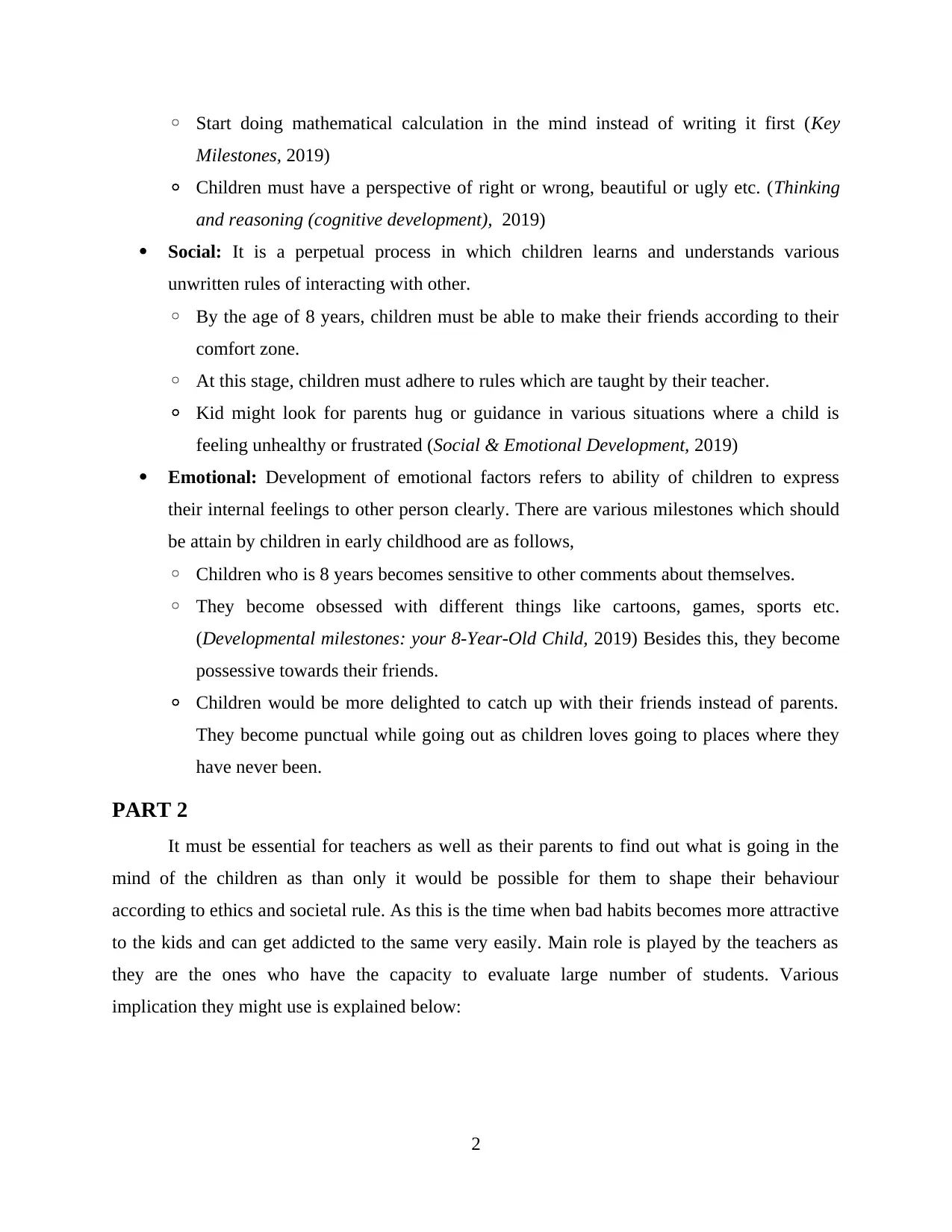
◦ Start doing mathematical calculation in the mind instead of writing it first (Key
Milestones, 2019)
◦ Children must have a perspective of right or wrong, beautiful or ugly etc. (Thinking
and reasoning (cognitive development), 2019)
Social: It is a perpetual process in which children learns and understands various
unwritten rules of interacting with other.
◦ By the age of 8 years, children must be able to make their friends according to their
comfort zone.
◦ At this stage, children must adhere to rules which are taught by their teacher.
◦ Kid might look for parents hug or guidance in various situations where a child is
feeling unhealthy or frustrated (Social & Emotional Development, 2019)
Emotional: Development of emotional factors refers to ability of children to express
their internal feelings to other person clearly. There are various milestones which should
be attain by children in early childhood are as follows,
◦ Children who is 8 years becomes sensitive to other comments about themselves.
◦ They become obsessed with different things like cartoons, games, sports etc.
(Developmental milestones: your 8-Year-Old Child, 2019) Besides this, they become
possessive towards their friends.
◦ Children would be more delighted to catch up with their friends instead of parents.
They become punctual while going out as children loves going to places where they
have never been.
PART 2
It must be essential for teachers as well as their parents to find out what is going in the
mind of the children as than only it would be possible for them to shape their behaviour
according to ethics and societal rule. As this is the time when bad habits becomes more attractive
to the kids and can get addicted to the same very easily. Main role is played by the teachers as
they are the ones who have the capacity to evaluate large number of students. Various
implication they might use is explained below:
2
Milestones, 2019)
◦ Children must have a perspective of right or wrong, beautiful or ugly etc. (Thinking
and reasoning (cognitive development), 2019)
Social: It is a perpetual process in which children learns and understands various
unwritten rules of interacting with other.
◦ By the age of 8 years, children must be able to make their friends according to their
comfort zone.
◦ At this stage, children must adhere to rules which are taught by their teacher.
◦ Kid might look for parents hug or guidance in various situations where a child is
feeling unhealthy or frustrated (Social & Emotional Development, 2019)
Emotional: Development of emotional factors refers to ability of children to express
their internal feelings to other person clearly. There are various milestones which should
be attain by children in early childhood are as follows,
◦ Children who is 8 years becomes sensitive to other comments about themselves.
◦ They become obsessed with different things like cartoons, games, sports etc.
(Developmental milestones: your 8-Year-Old Child, 2019) Besides this, they become
possessive towards their friends.
◦ Children would be more delighted to catch up with their friends instead of parents.
They become punctual while going out as children loves going to places where they
have never been.
PART 2
It must be essential for teachers as well as their parents to find out what is going in the
mind of the children as than only it would be possible for them to shape their behaviour
according to ethics and societal rule. As this is the time when bad habits becomes more attractive
to the kids and can get addicted to the same very easily. Main role is played by the teachers as
they are the ones who have the capacity to evaluate large number of students. Various
implication they might use is explained below:
2
Paraphrase This Document
Need a fresh take? Get an instant paraphrase of this document with our AI Paraphraser
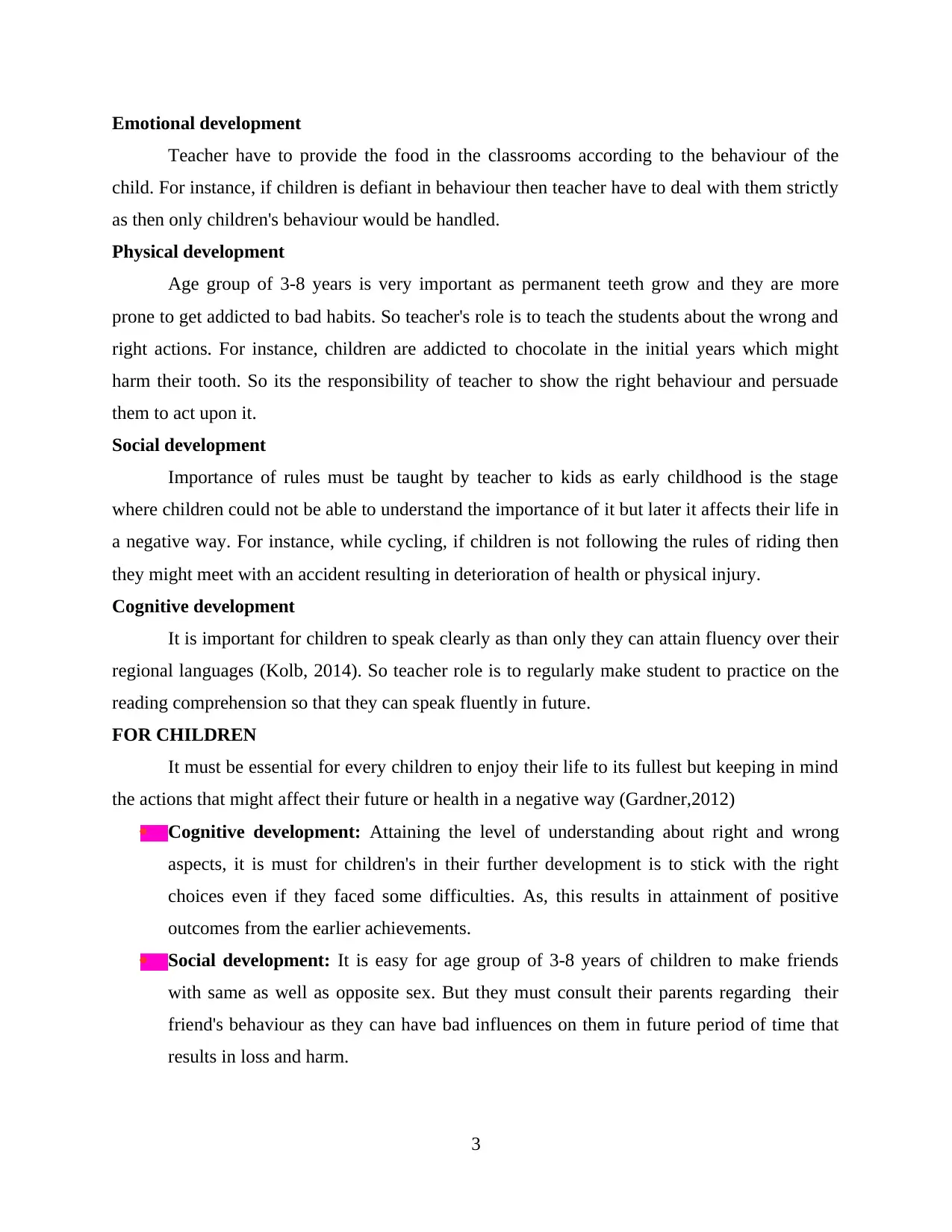
Emotional development
Teacher have to provide the food in the classrooms according to the behaviour of the
child. For instance, if children is defiant in behaviour then teacher have to deal with them strictly
as then only children's behaviour would be handled.
Physical development
Age group of 3-8 years is very important as permanent teeth grow and they are more
prone to get addicted to bad habits. So teacher's role is to teach the students about the wrong and
right actions. For instance, children are addicted to chocolate in the initial years which might
harm their tooth. So its the responsibility of teacher to show the right behaviour and persuade
them to act upon it.
Social development
Importance of rules must be taught by teacher to kids as early childhood is the stage
where children could not be able to understand the importance of it but later it affects their life in
a negative way. For instance, while cycling, if children is not following the rules of riding then
they might meet with an accident resulting in deterioration of health or physical injury.
Cognitive development
It is important for children to speak clearly as than only they can attain fluency over their
regional languages (Kolb, 2014). So teacher role is to regularly make student to practice on the
reading comprehension so that they can speak fluently in future.
FOR CHILDREN
It must be essential for every children to enjoy their life to its fullest but keeping in mind
the actions that might affect their future or health in a negative way (Gardner,2012)
Cognitive development: Attaining the level of understanding about right and wrong
aspects, it is must for children's in their further development is to stick with the right
choices even if they faced some difficulties. As, this results in attainment of positive
outcomes from the earlier achievements.
Social development: It is easy for age group of 3-8 years of children to make friends
with same as well as opposite sex. But they must consult their parents regarding their
friend's behaviour as they can have bad influences on them in future period of time that
results in loss and harm.
3
Teacher have to provide the food in the classrooms according to the behaviour of the
child. For instance, if children is defiant in behaviour then teacher have to deal with them strictly
as then only children's behaviour would be handled.
Physical development
Age group of 3-8 years is very important as permanent teeth grow and they are more
prone to get addicted to bad habits. So teacher's role is to teach the students about the wrong and
right actions. For instance, children are addicted to chocolate in the initial years which might
harm their tooth. So its the responsibility of teacher to show the right behaviour and persuade
them to act upon it.
Social development
Importance of rules must be taught by teacher to kids as early childhood is the stage
where children could not be able to understand the importance of it but later it affects their life in
a negative way. For instance, while cycling, if children is not following the rules of riding then
they might meet with an accident resulting in deterioration of health or physical injury.
Cognitive development
It is important for children to speak clearly as than only they can attain fluency over their
regional languages (Kolb, 2014). So teacher role is to regularly make student to practice on the
reading comprehension so that they can speak fluently in future.
FOR CHILDREN
It must be essential for every children to enjoy their life to its fullest but keeping in mind
the actions that might affect their future or health in a negative way (Gardner,2012)
Cognitive development: Attaining the level of understanding about right and wrong
aspects, it is must for children's in their further development is to stick with the right
choices even if they faced some difficulties. As, this results in attainment of positive
outcomes from the earlier achievements.
Social development: It is easy for age group of 3-8 years of children to make friends
with same as well as opposite sex. But they must consult their parents regarding their
friend's behaviour as they can have bad influences on them in future period of time that
results in loss and harm.
3
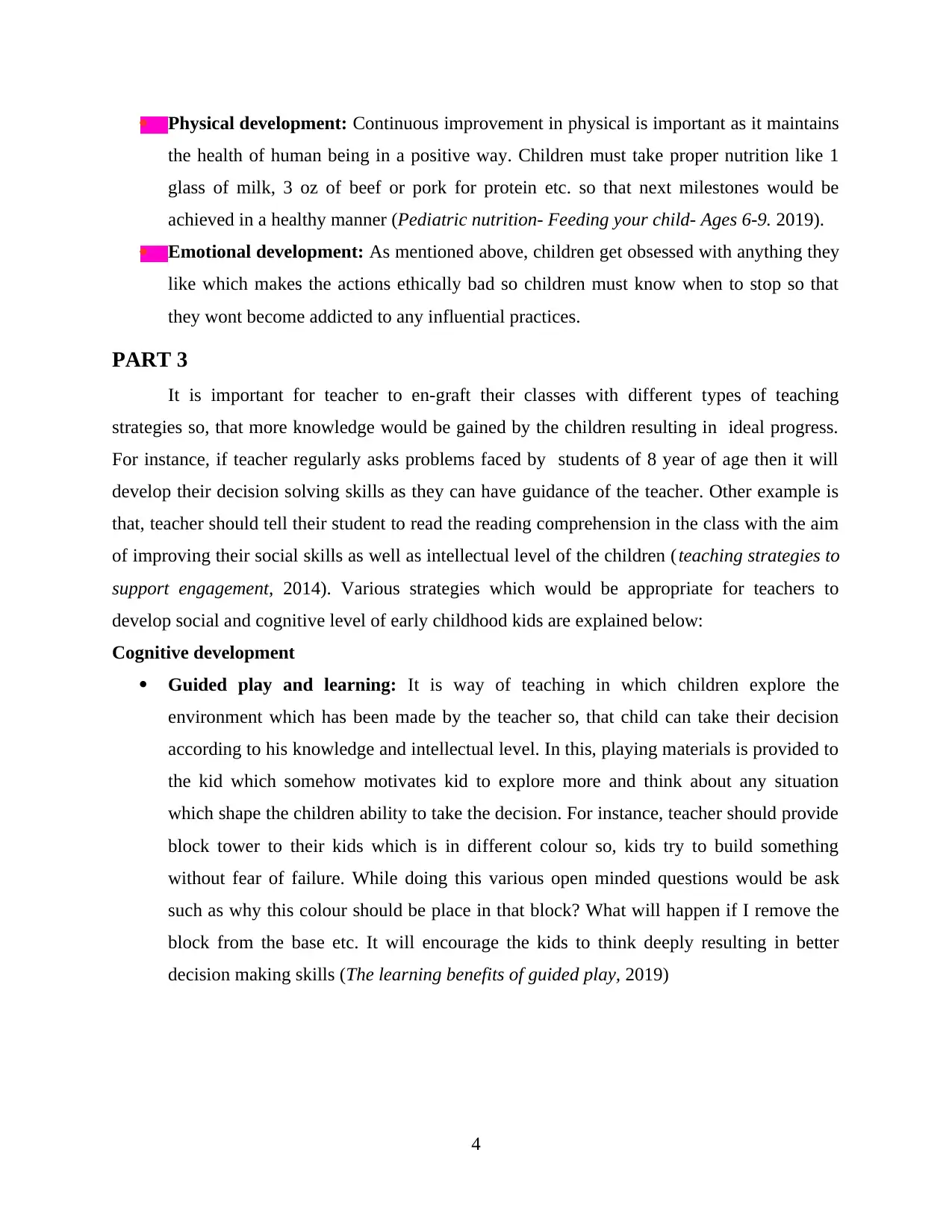
Physical development: Continuous improvement in physical is important as it maintains
the health of human being in a positive way. Children must take proper nutrition like 1
glass of milk, 3 oz of beef or pork for protein etc. so that next milestones would be
achieved in a healthy manner (Pediatric nutrition- Feeding your child- Ages 6-9. 2019).
Emotional development: As mentioned above, children get obsessed with anything they
like which makes the actions ethically bad so children must know when to stop so that
they wont become addicted to any influential practices.
PART 3
It is important for teacher to en-graft their classes with different types of teaching
strategies so, that more knowledge would be gained by the children resulting in ideal progress.
For instance, if teacher regularly asks problems faced by students of 8 year of age then it will
develop their decision solving skills as they can have guidance of the teacher. Other example is
that, teacher should tell their student to read the reading comprehension in the class with the aim
of improving their social skills as well as intellectual level of the children (teaching strategies to
support engagement, 2014). Various strategies which would be appropriate for teachers to
develop social and cognitive level of early childhood kids are explained below:
Cognitive development
Guided play and learning: It is way of teaching in which children explore the
environment which has been made by the teacher so, that child can take their decision
according to his knowledge and intellectual level. In this, playing materials is provided to
the kid which somehow motivates kid to explore more and think about any situation
which shape the children ability to take the decision. For instance, teacher should provide
block tower to their kids which is in different colour so, kids try to build something
without fear of failure. While doing this various open minded questions would be ask
such as why this colour should be place in that block? What will happen if I remove the
block from the base etc. It will encourage the kids to think deeply resulting in better
decision making skills (The learning benefits of guided play, 2019)
4
the health of human being in a positive way. Children must take proper nutrition like 1
glass of milk, 3 oz of beef or pork for protein etc. so that next milestones would be
achieved in a healthy manner (Pediatric nutrition- Feeding your child- Ages 6-9. 2019).
Emotional development: As mentioned above, children get obsessed with anything they
like which makes the actions ethically bad so children must know when to stop so that
they wont become addicted to any influential practices.
PART 3
It is important for teacher to en-graft their classes with different types of teaching
strategies so, that more knowledge would be gained by the children resulting in ideal progress.
For instance, if teacher regularly asks problems faced by students of 8 year of age then it will
develop their decision solving skills as they can have guidance of the teacher. Other example is
that, teacher should tell their student to read the reading comprehension in the class with the aim
of improving their social skills as well as intellectual level of the children (teaching strategies to
support engagement, 2014). Various strategies which would be appropriate for teachers to
develop social and cognitive level of early childhood kids are explained below:
Cognitive development
Guided play and learning: It is way of teaching in which children explore the
environment which has been made by the teacher so, that child can take their decision
according to his knowledge and intellectual level. In this, playing materials is provided to
the kid which somehow motivates kid to explore more and think about any situation
which shape the children ability to take the decision. For instance, teacher should provide
block tower to their kids which is in different colour so, kids try to build something
without fear of failure. While doing this various open minded questions would be ask
such as why this colour should be place in that block? What will happen if I remove the
block from the base etc. It will encourage the kids to think deeply resulting in better
decision making skills (The learning benefits of guided play, 2019)
4
⊘ This is a preview!⊘
Do you want full access?
Subscribe today to unlock all pages.

Trusted by 1+ million students worldwide
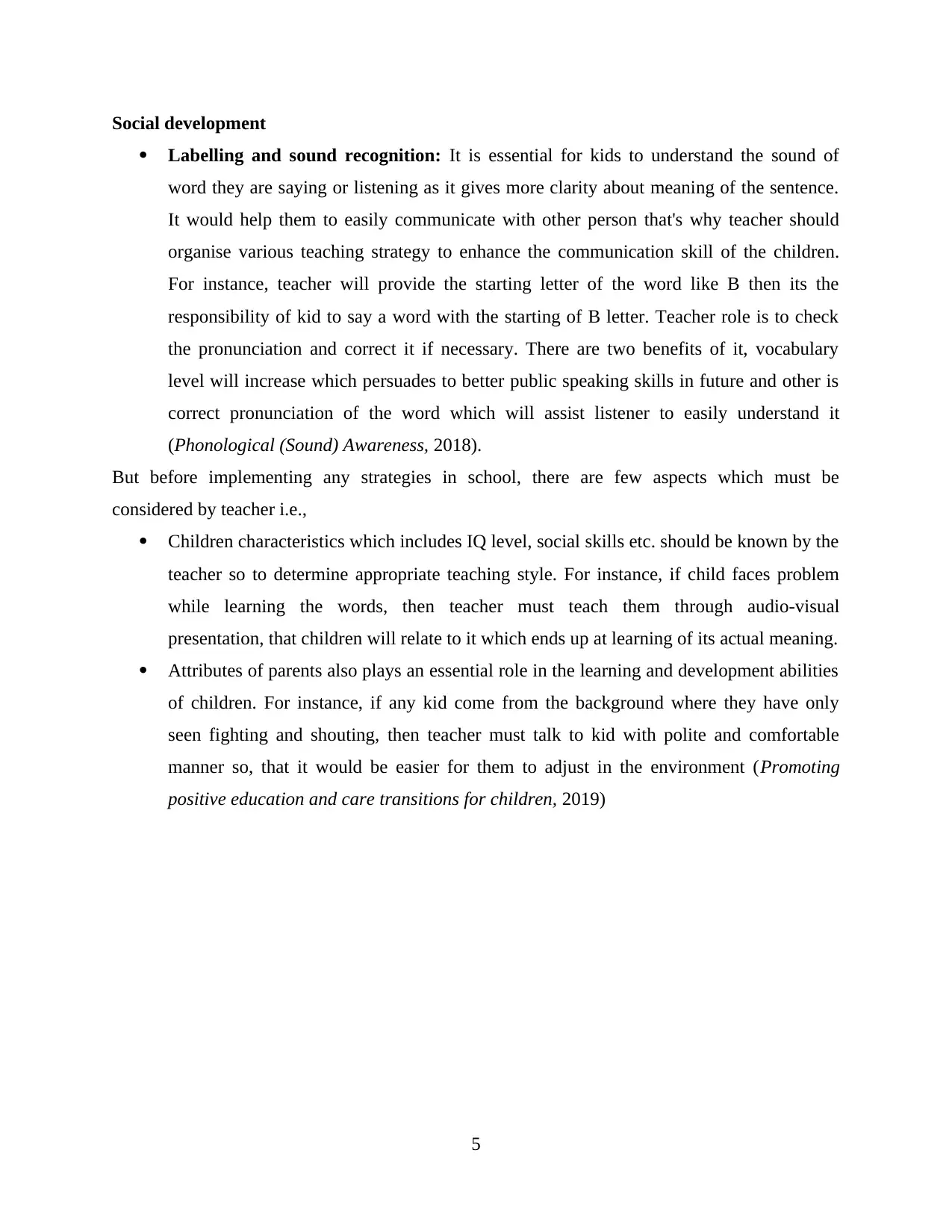
Social development
Labelling and sound recognition: It is essential for kids to understand the sound of
word they are saying or listening as it gives more clarity about meaning of the sentence.
It would help them to easily communicate with other person that's why teacher should
organise various teaching strategy to enhance the communication skill of the children.
For instance, teacher will provide the starting letter of the word like B then its the
responsibility of kid to say a word with the starting of B letter. Teacher role is to check
the pronunciation and correct it if necessary. There are two benefits of it, vocabulary
level will increase which persuades to better public speaking skills in future and other is
correct pronunciation of the word which will assist listener to easily understand it
(Phonological (Sound) Awareness, 2018).
But before implementing any strategies in school, there are few aspects which must be
considered by teacher i.e.,
Children characteristics which includes IQ level, social skills etc. should be known by the
teacher so to determine appropriate teaching style. For instance, if child faces problem
while learning the words, then teacher must teach them through audio-visual
presentation, that children will relate to it which ends up at learning of its actual meaning.
Attributes of parents also plays an essential role in the learning and development abilities
of children. For instance, if any kid come from the background where they have only
seen fighting and shouting, then teacher must talk to kid with polite and comfortable
manner so, that it would be easier for them to adjust in the environment (Promoting
positive education and care transitions for children, 2019)
5
Labelling and sound recognition: It is essential for kids to understand the sound of
word they are saying or listening as it gives more clarity about meaning of the sentence.
It would help them to easily communicate with other person that's why teacher should
organise various teaching strategy to enhance the communication skill of the children.
For instance, teacher will provide the starting letter of the word like B then its the
responsibility of kid to say a word with the starting of B letter. Teacher role is to check
the pronunciation and correct it if necessary. There are two benefits of it, vocabulary
level will increase which persuades to better public speaking skills in future and other is
correct pronunciation of the word which will assist listener to easily understand it
(Phonological (Sound) Awareness, 2018).
But before implementing any strategies in school, there are few aspects which must be
considered by teacher i.e.,
Children characteristics which includes IQ level, social skills etc. should be known by the
teacher so to determine appropriate teaching style. For instance, if child faces problem
while learning the words, then teacher must teach them through audio-visual
presentation, that children will relate to it which ends up at learning of its actual meaning.
Attributes of parents also plays an essential role in the learning and development abilities
of children. For instance, if any kid come from the background where they have only
seen fighting and shouting, then teacher must talk to kid with polite and comfortable
manner so, that it would be easier for them to adjust in the environment (Promoting
positive education and care transitions for children, 2019)
5
Paraphrase This Document
Need a fresh take? Get an instant paraphrase of this document with our AI Paraphraser
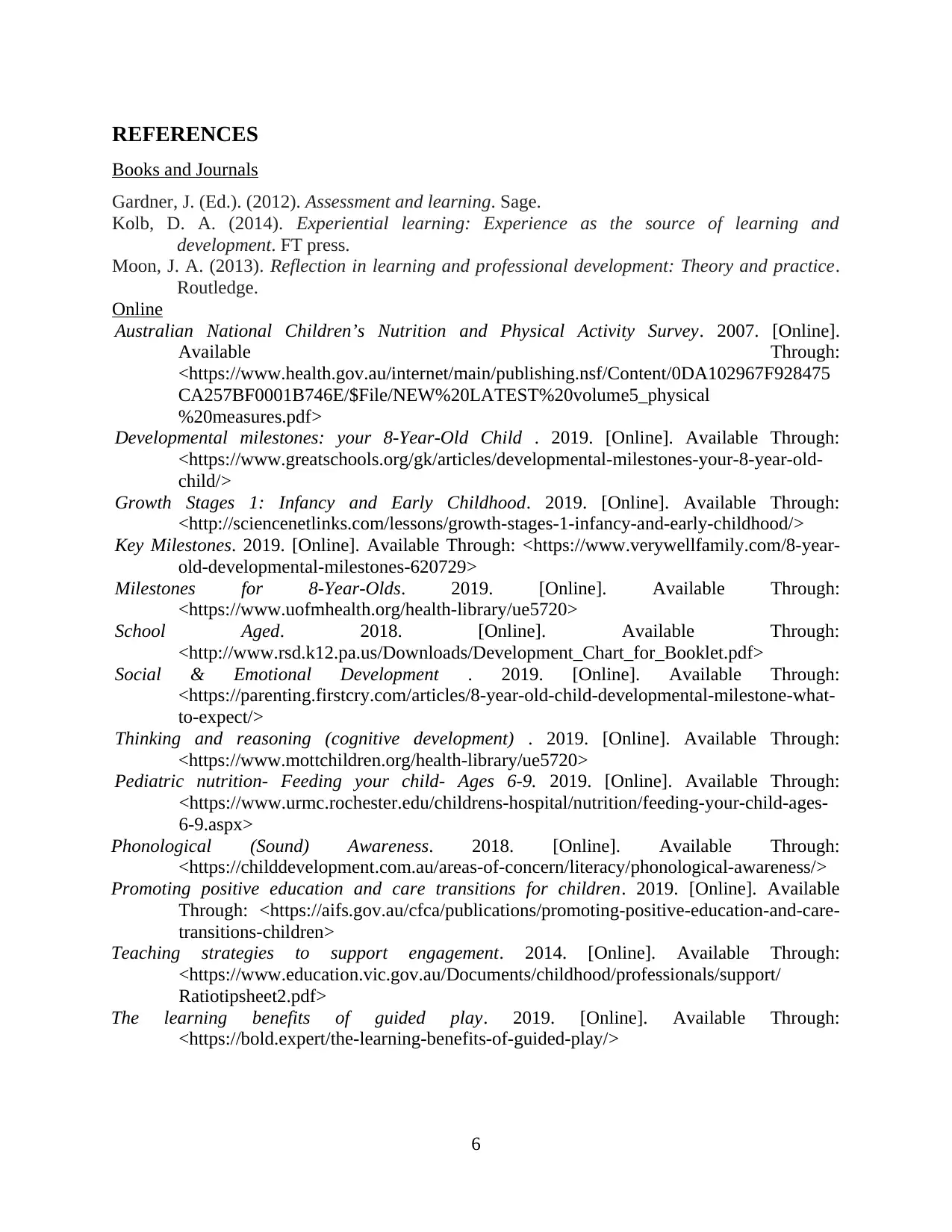
REFERENCES
Books and Journals
Gardner, J. (Ed.). (2012). Assessment and learning. Sage.
Kolb, D. A. (2014). Experiential learning: Experience as the source of learning and
development. FT press.
Moon, J. A. (2013). Reflection in learning and professional development: Theory and practice.
Routledge.
Online
Australian National Children’s Nutrition and Physical Activity Survey. 2007. [Online].
Available Through:
<https://www.health.gov.au/internet/main/publishing.nsf/Content/0DA102967F928475
CA257BF0001B746E/$File/NEW%20LATEST%20volume5_physical
%20measures.pdf>
Developmental milestones: your 8-Year-Old Child . 2019. [Online]. Available Through:
<https://www.greatschools.org/gk/articles/developmental-milestones-your-8-year-old-
child/>
Growth Stages 1: Infancy and Early Childhood. 2019. [Online]. Available Through:
<http://sciencenetlinks.com/lessons/growth-stages-1-infancy-and-early-childhood/>
Key Milestones. 2019. [Online]. Available Through: <https://www.verywellfamily.com/8-year-
old-developmental-milestones-620729>
Milestones for 8-Year-Olds. 2019. [Online]. Available Through:
<https://www.uofmhealth.org/health-library/ue5720>
School Aged. 2018. [Online]. Available Through:
<http://www.rsd.k12.pa.us/Downloads/Development_Chart_for_Booklet.pdf>
Social & Emotional Development . 2019. [Online]. Available Through:
<https://parenting.firstcry.com/articles/8-year-old-child-developmental-milestone-what-
to-expect/>
Thinking and reasoning (cognitive development) . 2019. [Online]. Available Through:
<https://www.mottchildren.org/health-library/ue5720>
Pediatric nutrition- Feeding your child- Ages 6-9. 2019. [Online]. Available Through:
<https://www.urmc.rochester.edu/childrens-hospital/nutrition/feeding-your-child-ages-
6-9.aspx>
Phonological (Sound) Awareness. 2018. [Online]. Available Through:
<https://childdevelopment.com.au/areas-of-concern/literacy/phonological-awareness/>
Promoting positive education and care transitions for children. 2019. [Online]. Available
Through: <https://aifs.gov.au/cfca/publications/promoting-positive-education-and-care-
transitions-children>
Teaching strategies to support engagement. 2014. [Online]. Available Through:
<https://www.education.vic.gov.au/Documents/childhood/professionals/support/
Ratiotipsheet2.pdf>
The learning benefits of guided play. 2019. [Online]. Available Through:
<https://bold.expert/the-learning-benefits-of-guided-play/>
6
Books and Journals
Gardner, J. (Ed.). (2012). Assessment and learning. Sage.
Kolb, D. A. (2014). Experiential learning: Experience as the source of learning and
development. FT press.
Moon, J. A. (2013). Reflection in learning and professional development: Theory and practice.
Routledge.
Online
Australian National Children’s Nutrition and Physical Activity Survey. 2007. [Online].
Available Through:
<https://www.health.gov.au/internet/main/publishing.nsf/Content/0DA102967F928475
CA257BF0001B746E/$File/NEW%20LATEST%20volume5_physical
%20measures.pdf>
Developmental milestones: your 8-Year-Old Child . 2019. [Online]. Available Through:
<https://www.greatschools.org/gk/articles/developmental-milestones-your-8-year-old-
child/>
Growth Stages 1: Infancy and Early Childhood. 2019. [Online]. Available Through:
<http://sciencenetlinks.com/lessons/growth-stages-1-infancy-and-early-childhood/>
Key Milestones. 2019. [Online]. Available Through: <https://www.verywellfamily.com/8-year-
old-developmental-milestones-620729>
Milestones for 8-Year-Olds. 2019. [Online]. Available Through:
<https://www.uofmhealth.org/health-library/ue5720>
School Aged. 2018. [Online]. Available Through:
<http://www.rsd.k12.pa.us/Downloads/Development_Chart_for_Booklet.pdf>
Social & Emotional Development . 2019. [Online]. Available Through:
<https://parenting.firstcry.com/articles/8-year-old-child-developmental-milestone-what-
to-expect/>
Thinking and reasoning (cognitive development) . 2019. [Online]. Available Through:
<https://www.mottchildren.org/health-library/ue5720>
Pediatric nutrition- Feeding your child- Ages 6-9. 2019. [Online]. Available Through:
<https://www.urmc.rochester.edu/childrens-hospital/nutrition/feeding-your-child-ages-
6-9.aspx>
Phonological (Sound) Awareness. 2018. [Online]. Available Through:
<https://childdevelopment.com.au/areas-of-concern/literacy/phonological-awareness/>
Promoting positive education and care transitions for children. 2019. [Online]. Available
Through: <https://aifs.gov.au/cfca/publications/promoting-positive-education-and-care-
transitions-children>
Teaching strategies to support engagement. 2014. [Online]. Available Through:
<https://www.education.vic.gov.au/Documents/childhood/professionals/support/
Ratiotipsheet2.pdf>
The learning benefits of guided play. 2019. [Online]. Available Through:
<https://bold.expert/the-learning-benefits-of-guided-play/>
6
1 out of 8
Related Documents
Your All-in-One AI-Powered Toolkit for Academic Success.
+13062052269
info@desklib.com
Available 24*7 on WhatsApp / Email
![[object Object]](/_next/static/media/star-bottom.7253800d.svg)
Unlock your academic potential
Copyright © 2020–2026 A2Z Services. All Rights Reserved. Developed and managed by ZUCOL.





